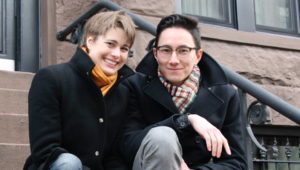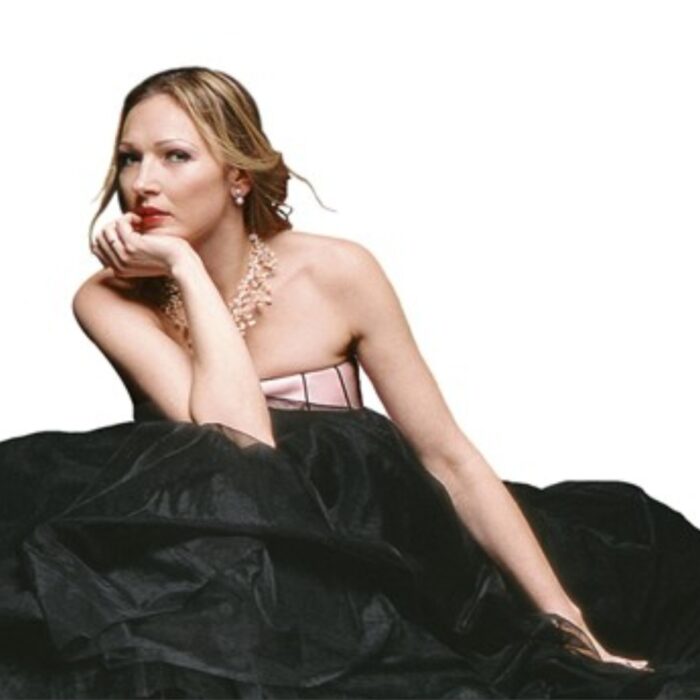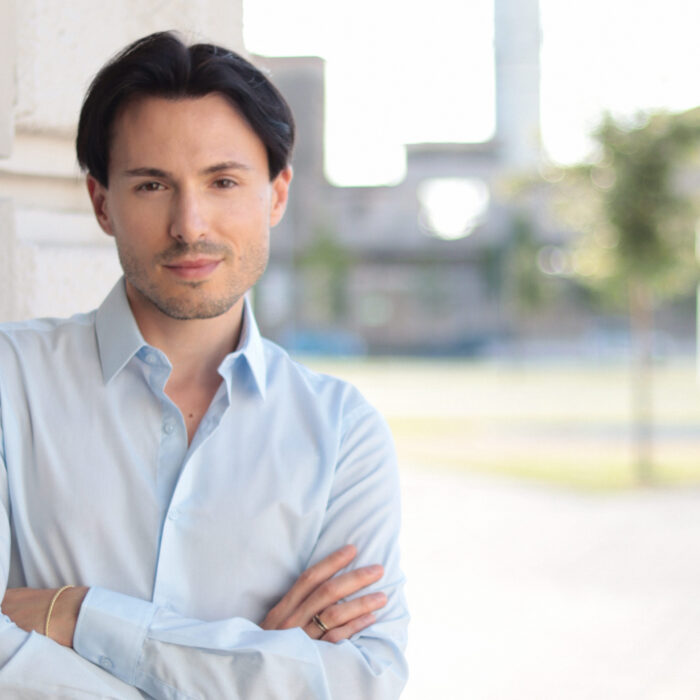
Q & A: Heartbeat Opera Co-Artistic Director Louisa Proske on ‘Carmen,’ Trump & Borders, & The Process & Vision of the Company
By David SalazarHeartbeat Opera wants to be a gateway drug. At least that is how Co-Artistic Director Louisa Proske views many of the initiatives that her opera company has undertaken since its inception just a few years ago.
Not only does the company offer unique adaptations of some of the great operatic masterpieces this spring, but it offers other “hybrid events” in the fall, intended to lure in unsuspecting audiences. The fall season is usually the time for these kinds of showcases, usually excerpts or even drag shows that offer a vibrant environment and operatic performances.
“People come for the party but they are seduced by the opera and will come back for a full production,” Proske told OperaWire in a recent interview.
As part of the New York Opera Fest 2017, the company is currently in the midst of a run of “Butterfly” and “Carmen,” stripped-down adaptations of the two iconic operas bearing the same name (“Madama Butterfly” in the case of the former) intending to provide unique perspectives on the famed works.
While speaking with OperaWire, Proske outlined the company’s beginnings, its vision, its process, and its future.
OperaWire: Where and how did Heartbeat Opera start?
Louisa Proske: Me and [Co-Artistic Director] Ethan [Heard] went to the Yale School of Drama. We are both theater directors and we both have an early history of opera. We were child singers and performers, Ethan with the Washington National Opera and me with the Komische Oper in Berlin.
At Yale, we had this class called the Opera Practicum where we would get together with the singers from Yale and have master teachers like Francesca Zambello and Christopher Alden come in and guide us in directing the singers in famous opera scenes. And that was a legendary class. A lot of exciting ideas were born there for different operas. The singers loved working with us.
OW: What was one major takeaway from that class?
LP: Something that struck us in that class was experiencing a scene from a Donizetti or Mozart opera and being feet away from the singers doing specific work like actors. So we wanted to bring the energy and excitement of that class to a wider audience. That was the initial thought.
And then in New York, it was around the time that New York City Opera closed. We felt a real need to provide a new vision for opera. We love this art form and we felt that we really need to reinvent the format to get new audiences.
OW: When you take on a piece, what are your criteria for adapting an opera?
LP: We want to illuminate a certain part of an opera that we see as essential. We see things in an opera that excite or trouble us a bit. And we work in a mixture of reverence or even irreverence. So on the one hand, we love these pieces. We are not looking to spite them. But we question the way that tradition has amassed around us. This year we questioned the way stereotypes and clichés have amassed around “Butterfly” and “Carmen.”
OW: So what troubled you about “Carmen?”
LP: So, in Carmen, I was troubled by the idea of the femme fatale. The bad woman who drags the good man down. I felt that looking at the opera itself, that was not the case. And then there is this cliché of the death wish and that she knows she is going to die at the end and walks into it with open arms. And I wanted to see that final scene from a different angle and portray Carmen as someone who really wants to live and fight until the last moment. So that scene gets a new flavor. I think it might be a bit more resonant and even disturbing in 2017.
OW: So to get to that vision of the final scene, what other things did you have to alter or balance in the rest of the opera to get that characterization throughout?
LP: I would argue that it wasn’t an alteration but just looking at the text differently. There is no bullfight arena in our version, so the sounds that are coming from the bullfight are now cellphone sounds and the scene is built around her texting her friends to try and help her get out of this. I think that’s in the opera. She looks at Don José and she sees that he’s crazy. So she tries to figure out a way to save herself and the scene becomes very much about the cell phone. He actually takes it away from her and throws it over the fence. It has these echoes of domestic violence that are in the piece. The scene is an incredible investigation of the escalation. I think he is so desperate and can’t live without her, but he has this raw violence and he’s been so humiliated throughout the opera that it just breaks out of him.
OW: How did you handle the other characters in your version?
LP: We do have Carmen, Don José, Escamillo, and Michaela, but we also have two invented characters who are really supportive and played by actors. One is a guard, almost like Zuniga, but he’s an actor and doesn’t sing. Then there is a smuggler. We went to the original Merimée where Carmen is kind of the leader of her own gang. Bizet had to tone it down because of the bourgeois audiences. So we went back to the source and put things that Bizet would have liked but the censors would not allow it.
OW: What is the adaptation process like? For example, you know you want to do something with “Carmen,” but how do these conversations actually start and what work has to be put in to get to where you are now?
LP: It is both director-led, but it is very collaborative and much more collaborative than other opera processes. Our music directors join the process and movement directors are also involved as well as set designers. It always starts with an idea that is often in conversation with how the opera is done in the past.
For example, last season there was “Lucia di Lammermoor.” I was always bothered by how she was portrayed as this very weak victim from the start. And I think the music shows something wilder and anarchic. And with the mad scene, I never believed it. I never believed that 60 people would stare at a woman for 30 minutes and not do a single thing. So we did the mad scene without a chorus. And we put her in a hospital room with nurses cleaning her up as she is singing. So then we got to this image of a woman constrained to a bed listening to the Donizetti opera on the radio and then she starts to imagine the story in her own head. And then that could justify the smaller orchestration because that is how SHE hears it. The conception always leads to the arrangement. We want it to be dramatically justified.
In “Carmen,” the whole piece takes place at a fictional border, though I would argue that it has echoes of the US-Mexico border. The musicians are kind of the troubadours of Carmen’s organization.
But it happens over a long period of time. I think today projects are done on short notice or people are swept up in six projects at a time and attention is minimal. So one thing that we set out to do when we started the company is to give ourselves a long phase of dreaming, revising the idea, and then even discarding it and cooking it on a slow fire; then we can make something that is unique.
OW: How long is the process from conception to being ready for production?
LP: We go on retreat in the summer and select the pieces. And then there is a phase where we look for the space. I would say the actual planning is somewhere between seven and eight months. In the case of “Carmen,” I had a different conception until the election of [Donald] Trump and then I wanted to find a way, without updating it in a cheap way, to let the piece speak to something of the current moment, because I was very disturbed and artists were speaking a lot about how we should respond. But then I thought about the piece a lot and it already has these questions of clashing cultures and people trying to cross borders and enforce them. I transposed the piece to a border crossing, but it was actually not a terribly big leap. The soldiers become guards and the smugglers become traffickers.
OW: So what was the concept for the opera before the election?
LP: It was set more in an Abel Ferrara neo-noiresque New York. It is still focused on the main relationship. I always felt like the picturesque elements, like the flamenco dresses, the cute smugglers, and bullfighters, were dampening the unbelievable explosiveness of the main relationship. I think Don José and Carmen share one of the most exciting and disturbing relationships in all of opera. They cannot be together but cannot be apart. I think that it is so truthfully drawn. If you go through the scenes, the beats are impeccable for a director. And I wanted to strip away the parts of the world that are taking away from the danger and joy they share. So the previous conception already had that. It had an ugly world, but then it became more specific.
OW: In your view, how do you understand Carmen’s feelings for Don Jose?
LP: I think we ask that question a lot in rehearsal. I hope the audience keeps asking it. I think she is deeply in love with freedom and anarchy and against borders and law and order. So this moment, this inexplicable moment where he acts against his own self-interest and unlocks the handcuffs, sets a fire in her and she gets turned on by that. Does she love him after that? I don’t know. I think there is an attempt to create a space for that. But then the next thing that happens is she dances for him and then he decides to leave and take orders. That’s a disaster. I think they are completely incompatible people, but there is an attraction just because they are so different and incompatible. He is completely tied to her as he says several times, but I think tragically she is also tied to him. There are moments where she could have walked out and in the end, I think that’s what she wants, but there are still feelings for her. It hurts her to do what she is doing to him, but she knows she’s in danger.
OW: How has the process been different this year from other years?
LP: It’s been great. It has been a short tech period. We have been in the space for a week less than last year. It was very condensed and quick, but it’s really been great. The previews were great and now we’re running.
OW: Looking forward, what are other operas you have planned and what ideas are springing up around them?
LP: So many dream projects. We are thinking a lot about spaces that we want to be in New York. Our ultimate dream is the Park Avenue Armory. We want to do Mozart in the near future. We are purposefully holding off because we want to have enough rehearsal time and bigger bands than what we are doing. We are dying for “Magic Flute,” “Don Giovanni.” I think those pieces are exciting to turn on their heads. “Pélleas [et Mélisande]” is also a big dream that we argue over every year and whether we can do it with a reduced band or if that is so against the point. I think we will do more baroque.
OW: What ideas are formulating around “Don Giovanni?”
LP: I think that is still early to say. I have a hunch, which is usually the case. I do think that with “Don Giovanni” there is such a tradition in the last 10 or so years of bashing him by directors. The politically correct thing is to make him evil. But I think there is more in the music and I think that limits the perspective on the opera. I love Kierkegaard’s writing on Don Giovanni as this forceful center around which all the other characters orbit. That would be one vague instinct and work against that.


